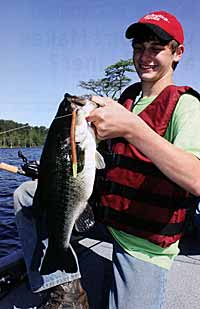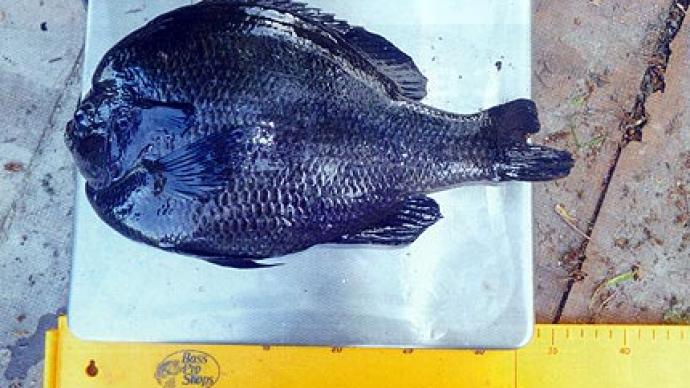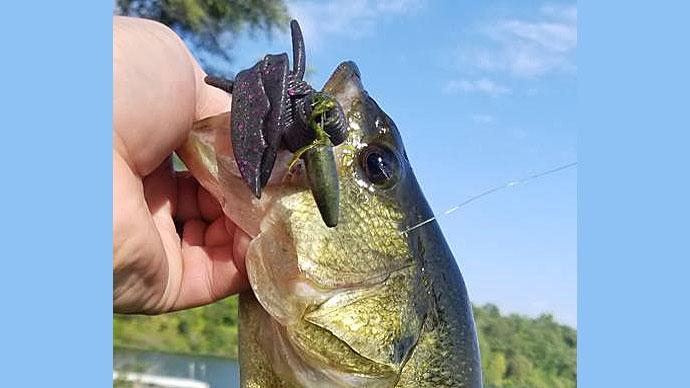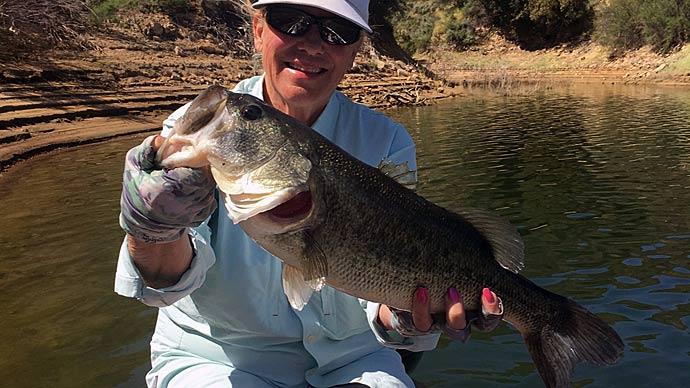
When I learned I would get the opportunity to fish at the King Fishers Society on Richmond Mill Lake, I was thrilled—thrilled because of the amazing fishing I had heard about on this 120-acre private North Carolina Lake. The fishing on the lake was every bit as amazing as I expected. I probably caught more 3 to 5 pound bass in one day than I had caught in my entire life. However, as much as I enjoyed the fishing, I also enjoyed the chance to learn about why and how Richmond Mill Lake is managed.
While on this trip, I got to meet and spend time with Bob Lusk, the Pond Boss. He is the one who has worked with the owners of Richmond Mill Lake and oversees its management. Along with what I learned specifically about Richmond Mill Lake, its needs and the management solutions, I also learned about several great management tactics and principles that could be applied to many different ponds and lakes.
During my visit to King Fisher Society, I even got to take part in a portion of the management of the lake by helping stock pellet-trained adult bass into the lake. Using boats and big bins of water, we spread the fish all over the lake, dividing the bass among the feeder locations.
I would like to share some of what I learned from listening to the Pond Boss and by spending time at Richmond Mill Lake.
One of a Kind One of the first things I learned on my trip to Richmond Mill Lake was how every lake is different. Since every lake is different, every lake needs a different type of management in order to thrive. Richmond Mill Lake is a perfect example of this. Since Richmond Mill Lake naturally has infertile and highly acidic water, the fish in the lake would not thrive without intensive management. Historical bass populations included modest numbers of mostly small fish with an occasional big bass. The lake also has a tremendous amount of water running through it, so traditional management strategies like fertilizing the lake would not work. Basically, all of the added fertility would end up washing right through the lake.
The management plan that Mr. Lusk devised includes an intensive feeding system that uses specially formulated pellets. The pellets feed the bass and bluegills directly, providing important nutrition, but they also provide the foundation for the entire food chain. When the feeders went off, it was amazing to see just how many fish were sitting there waiting for dinner. Looking around the lake, I could see several feeders going off, and every one of them had fish beside it - all waiting to get fed.
Needs Ongoing Management
Richmond Mill Lake is very management- dependent, and the management has to be ongoing. It is not something that the owners could just stop doing or take a break from and expect the fishing quality to stay the same. If they stopped feeding the fish at Richmond Mill Lake and stopped other management practices, the decline would begin fairly quickly, and it would be dramatic.
Not every lake or pond has so much water running through it or the same issues with natural fertility or acidity. Every lake has its own needs, though, and those needs are ongoing. Whether management involves taking out some of the fish, feeding the fish, controlling vegetation, fertilizing the water, or whatever else, consistent management is essential to maintaining the best possible fishery.
Harvesting
Harvesting fish was another management concept I learned about on my trip to Richmond Mill Lake. So far they have not had to actively harvest fish from this particular lake, but from listening to conversations, I was still able to learn a lot about the value of harvesting fish. I learned that having more fish in your pond or lake isn't necessarily better—especially if your goal is to grow quality fish.
Just the other day I overheard a conversation between two men. They were talking about the fishing in a private pond that one of them owned. The man who owned the pond told the other fellow that he wasn't going to be fishing on his pond for about a year. He said that the fish in his pond weren't getting as big as he wanted them to, so he was going to let them stay in there without getting caught or harvested for about a year so they could grow bigger. He said he had about 200 fish in his pond but none of them seemed to be getting big.
After hearing this conversation and his theory about growing better fish, my mind went back to some of the things I had learned about pond management and particularly about harvesting fish. As I think about what I heard in the conversation between those two men, I think that the owner of the pond would be much better off harvesting a portion of his fish so that the fish that are left in there will have less competition for food and therefore be much more likely to grow bigger.
Although harvesting has not been a big part of the management of Richmond Mill Lake, it is something that Mr. Lusk foresees some time in the future.
Lake Harmony
The best lakes in the country are the ones that live in harmony with themselves. I learned from listening to Mr. Lusk about some of what has gone on in Richmond Mill Lake over the years and how the habitat has developed since it has been intensively managed. I learned about the food chain of the lake and also about plant growth and other factors that play into the harmony of this lake.
Over time Mr. Lusk has been able to see the results of the wonderful harmony in this lake. He has seen aquatic insect population grow. For example, when the mosquitoes came, the dragonflies came to eat the mosquitoes, and both now provide extra menu items for the bluegills and the bass. He has also begun to see ospreys, eagles and other wildlife he hadn't seen in the past I think that when you strive to create and maintain a successful fishing lake or pond, what you are really trying to achieve is a lake in perfect harmony. Because in a lake with perfect harmony, everything works together for the benefit of the lake, therefore producing better results for quality fish and better habitat.
About the Author
Fourteen-year-old Nathaniel Samsel of Clarkesville, Georgia is an avid fisherman and aspiring outdoor writer. He often travels with his dad, Jeff Samsel, a full-time writer and photographer who writes mostly about fishing.
For More Information:
To learn more about King Fisher Society and the fishing on Richmond Mill Lake, visit www.kingfishersociety.com.
Reprinted with permission from Pond Boss Magazine



